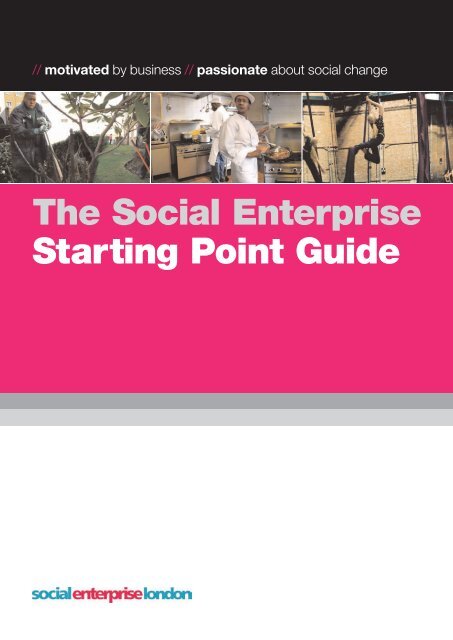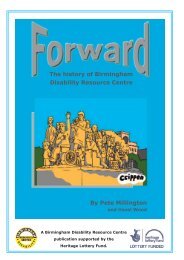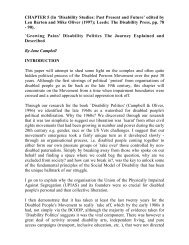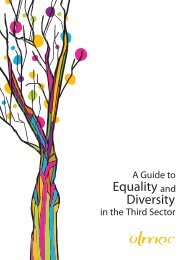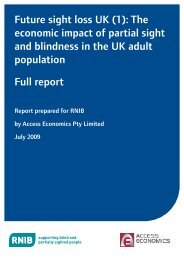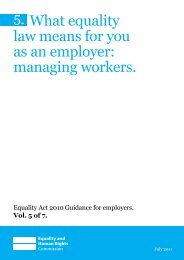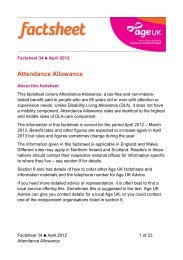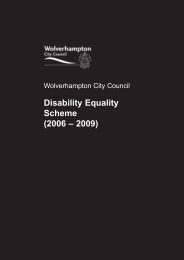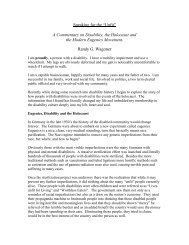The Social Enterprise Starting Point Guide
The Social Enterprise Starting Point Guide
The Social Enterprise Starting Point Guide
You also want an ePaper? Increase the reach of your titles
YUMPU automatically turns print PDFs into web optimized ePapers that Google loves.
motivated by business // passionate about social change<strong>The</strong> <strong>Social</strong> <strong>Enterprise</strong><strong>Starting</strong> <strong>Point</strong> <strong>Guide</strong>
Page 1<strong>The</strong> <strong>Social</strong> <strong>Enterprise</strong><strong>Starting</strong> <strong>Point</strong> <strong>Guide</strong>// About this guideThis guide is aimed at social entrepreneurs – by which we mean anyone with an ideafor making money and using it to benefit others in some way. This is a big and diversegroup that includes all sorts of enterprising individuals from a variety of backgrounds.What unites them all is that they are motivated by business and passionate aboutsocial change.<strong>The</strong> next few pages will offer guidance on the sort of things you need to think aboutwhen starting out on your journey to set up a social enterprise. It looks at the basicissues facing start-up social enterprises and will help you to summarise your ownspecific needs to figure out the next steps you need to take.At the back of this guide is a list of members of the London <strong>Social</strong> <strong>Enterprise</strong> Networkwhich will help improve your understanding of the businesses out there and how theyoperate. In no time at all you’ll have the knowledge and confidence you need to be anoutstanding and successful social entrepreneur.
Page 2// About <strong>Social</strong> <strong>Enterprise</strong><strong>Social</strong> enterprise can be a confusing concept. Lots of people talk about it but no oneseems to be able to put their finger on exactly what it is. <strong>The</strong> confusion is caused bythe fact that social enterprise can look like lots of different things depending on theobjectives and structure of the organisation. <strong>The</strong>re are, though, two characteristicsthat all social enterprises exhibit from the moment they come into existence.<strong>The</strong>se are:That they all sell goods and/or services in order to generate a profitThat they use this profit to benefit society, instead of keeping it forprivate gainTo give you an idea of what social enterprises tend to be like we can look at the waysin which they are set up, and their reasons for doing so. <strong>The</strong> following descriptionsare fictional but all resemble real businesses operating in the UK.// <strong>The</strong> Ethical BusinessBusiness A was set up by a young graduate who wanted her business to be morethan just a way of making her money. Having grown up in the inner city she was veryaware of the situations of less advantaged people both in the UK and abroad. Herbusiness sells clothes made exclusively by a community in Africa with which sheonce spent time volunteering. <strong>The</strong> clothes are sold via a website that she built herself.She draws a salary from the business and gives most of the profits generated to theAfrican community. She also uses some profit to give talks at schools and communitycentres about the opportunities available for school leavers to volunteer abroad. Thisway she is contributing both to the development of the third world and the careersof young people in the UK.// <strong>The</strong> Voluntary Sector EntrepreneursOrganisation B runs a scheme to assist people with disabilities into employment. Forseveral years they have provided training in plumbing and now they have a team ofskilled workers with a service to sell. While they receive grant funding from their localauthority, this is only ever on a 2-year basis and it is never guaranteed. To ensure thatthey can continue to empower people with disabilities they have concentrated alltheir efforts on running a business as opposed to a ‘project’. <strong>The</strong> profits made payreal wages to the employees as well as contributing to the training budget for newtrainees.// <strong>The</strong> Charity’s Trading CompanyCharity C is very small but has been working for years to find a cure for a raredegenerative disease. <strong>The</strong> organisation was previously reliant on grants from thegovernment and donations from the public. Because the disease is so rare, itreceives little attention from people other than those whose lives are directly affectedby it. In order to generate funds the charity decided to set up a trading arm, therebyavoiding UK Charity Law restrictions. <strong>The</strong> trading arm has designed and copyrighteda specialist course of therapy that it sells to hospitals and doctor’s surgeries aroundthe world. <strong>The</strong> profits made are re-invested into research for an eventual cure.
Page 4// Is <strong>Social</strong> <strong>Enterprise</strong> for you?Do you have a social aimor social purpose(s)?YesYou sound more like a Privateg No f BusinessffIs your organisation set upprimarily to achieve this?Refer to mainstream BusinessSupport Organisation – seewww.bl4london.comYesgDo you (plan to) trade inthe market to fulfil yoursocial aim?No fYou sound more like aVoluntary OrganisationffContact a Voluntary SectorSupport Organisation – seewww.lvsc.org.ukYesgDo you want to bea <strong>Social</strong> enterprise?No fWhy not?I don’t want my social aim tobe relevant to my business fI still don’t see the point fCall SEL for a chat on020 7022 1920YesgGreat!Now what kind of advicedo you think you need?ffGeneral support/mentoringSee page 5Financial issuesSee page 13Legal structuresand incorporationSee page 8Sales and Marketing,Managing people, Websitesand IT, Tendering, Developing,Ideas, Planning andOperations, Premises, Health& Safety, Importingand ExportingVisit www.setas.co.uk or callSEL on 020 7077 1920.
Page 5// Finding Business Support and Advice<strong>The</strong> main thing to remember when setting up or running a social enterprise is that itis first and foremost a business. As with ‘conventional’ businesses, you need tomarket your services, do your accounts, complete tax returns, comply with Healthand Safety regulations and do everything else that a business has to do. On top ofthat it’s likely that you’ll have other elements to cope with that arise from your socialaim. This means that you are more that just a business and as a result you willprobably need specialist advice. <strong>The</strong> next two sections of this guide will look at twoareas in which social enterprises often differ from ‘standard’ businesses - legalstructure and financing - but the following section will look at general business adviceand mentoring: how to find it and how to get the most out of it.// NeedsWritten Constitution/Legal IdentityManagement Committee/TrusteesAccountingManagement TrainingHuman ResourcesFundingFinanceMarketingSellingPremises// Areas for ConsiderationWhat company form should you take?Do you have operational documentation?Do you have a board of directors/trustees/stakeholders who will help your business to develop?Do you have a system in place?Do you need an accountant?Have you considered measuring yoursocial impact?Do you have a business plan? Is it up to date/useful?Do you feel able to run a business right now?Are you up on employment legislation?Do you need to provide staff training?Are your staff aware of their company’s socialmission?Do you need extra funding? Are you eligible?Is your existing funding adequate?Short term or Long Term Funding?Grants vs. loans?Do you have the right type of bank account?Is it the best kind for a social enterprise?Do you have any contingency financial reserves?Have you researched your markets?Are you aware of all the tools and techniques?How are you following up on your marketing toactually make sales? What are the benefits of yourproduct to your customers and stakeholdersIs your workspace appropriate for your business?Are you leasing or would it be better to own propertyinstead?
Page 6// Choosing a business advisorBusiness advice can take many forms, from attending a workshop or seminar toworking on a one-to-one basis with an adviser or mentor over a prolonged period oftime. Finding and selecting a business advisor you feel comfortable with is thereforevitally important.To make sure that you receive sound, consistent and quality advice it is important towork with an accredited business support organisation wherever possible. Advisorsare likely to be accredited by either a professional advisory body such as the Instituteof Business Advisors (IBA) or, if they are independent consultants, the SmallFederation of <strong>Enterprise</strong> Development Initiative (SFEDI). That said however, businesssupport can come from many other sources that may not be accredited by theseinstitutions. Accountants and marketing professionals, for example, may belongto Chartered Institutes and these also indicate that the adviser is reputable.<strong>The</strong> London Business Support Network, part of Business Link for London, bringstogether providers of publicly funded business support. <strong>The</strong>y endorse a qualityassurance programme called Customer First. Organisations bearing this logo havemet certain criteria that prove their ability to work well with clients.Whatever their accreditation, it is always a good idea to ask for references from pastclients as these will give you a much better idea of the kind of service you can expectto receive.// Access to support<strong>The</strong> cost of business support varies greatly from nothing to thousands of poundsdepending on the time spent and the complexity of the service. You will need tonegotiate the price based on the resources available to you and the kind of serviceyou are looking for. <strong>The</strong>re is some free business support available for socialenterprises, especially those just starting out. <strong>Social</strong> <strong>Enterprise</strong> London has plenty ofexperience in helping people to set up, grow and transform social enterprises. At anyone time there are a number of schemes on offer aimed at different people, withdifferent needs, in different areas. Below is a list of what is currently on offer andan indication of when they are available.<strong>Social</strong> <strong>Enterprise</strong> Open Surgery - SEL's Open Surgeries are a space to learn moreabout social enterprise - ask questions, get advice and meet others starting-up orgrowing social enterprises. <strong>The</strong>se free surgeries, run regularly, take the form of apresentation and a question and answer session. Anybody from London is welcome,so give us a call on 020 7022 1920 to find out more.<strong>Social</strong> <strong>Enterprise</strong> Technical Events – SEL runs quarterly workshop events on topicsessential for the efficient running of successful social enterprise businesses. Pastsessions have looked at topics such as marketing, finance, legal issues and propertyacquisition. Entrance to the events is free to all London based social enterprises,charities and voluntary organisations. To find out more call us on 020 7022 1920
Page 7Gr02 Business Consultancy – SEL is co-ordinating a network of specialist advisorsacross the most disadvantaged areas in London to provide in depth businessconsultancy to social enterprises already in operation. Gr02 offers a mix ofworkshops, 1-2-1 advice and mentoring from a dedicated business advisor. Toreceive this support you must have been in operation for over 18 months and beemploying fewer than 250 people. To find out more give us a ring on 020 7022 1920.Performance Measurement Tool – SEL has developed the electronic PerformanceMeasurement Tool, a simple, do-it-yourself method of measuring and managing yoursocial enterprises’ performance. <strong>The</strong> Performance Measurement Tool helpsorganisations to make decisions, track and review progress and set performancetargets and is available to download free from SEL’s website – www.sel.org.ukLondon <strong>Social</strong> <strong>Enterprise</strong> Networking Events – For a small yearly membership feeof £35 (plus VAT), the London <strong>Social</strong> <strong>Enterprise</strong> Network offers excellent value formoney. Quarterly networking events give social entrepreneurs the opportunity tomeet, socialise and make valuable working relationships with peers in a supportiveatmosphere. <strong>The</strong> events involve some form of training or practical information.Network members receive a regular newsletter, ‘Update’, featuring all the latest news,training and funding opportunities as well as the opportunity to sell goods andservice on the world’s only social enterprise specific shopping websitewww.shopsocialenterprise.com. If that’s not enough members are also profiledin the annual London <strong>Social</strong> <strong>Enterprise</strong> Network Directory.// Other sources of support<strong>The</strong> <strong>Social</strong> <strong>Enterprise</strong> London website lists further support organisations –go to www.sel.org.uk.
Page 8// All things legalIf there is anything that is going to put a social entrepreneur off going ahead with theirbusiness idea, it is the legal aspects of setting up a company. Can you just startselling things without letting the government or some other official agency know? Arethere a bunch of forms that need filling out before you can get your headed paperprinted?A little bit of background knowledge can help you to make the right decisions. Onceyou know what you have to do, the rest is fairly simple. <strong>The</strong>re are certainly forms to fillin, but these are not as daunting as they may seem.Before you start, one thing to bear in mind is that a social enterprise is not a legalstructure. You can’t ask a lawyer to set you up as a social enterprise. <strong>The</strong> socialenterprise bit is driven by your social mission, not the legal structure.For social enterprises starting out, there are two major things to decide. <strong>The</strong> first iswhether or not to incorporate and the second is which legal structure to adopt whenincorporating. In this section of the guide we will give you the basic information aboutlegal structures and at the end is a simplified flow chart to help you decide whichroute is best for you. But be aware that this is a very important decision to make,so you will almost certainly need to do some further research of your own.// IncorporationBy incorporating you are giving your business a separate legal identity. This meansthat if you enter into any contracts, employ any staff or lease property, it is thecompany that is doing so, and not the owner. This is a very important point becauseit means that the company holds liability and not you. If you don’t incorporate then allthe risk taken on, such as loan repayments or penalties from breaking a contract, willbe down to the individual – and this could cause a variety of problems.It is important to point out that it is not always necessary, or appropriate for a socialenterprise to incorporate. Lots of successful social enterprises are unincorporatedand yet are still recognised as trading businesses. <strong>The</strong>se include sole traders, orunincorporated associations. Going back to our descriptions at the beginning of thisguide, the lady that runs the ethical business selling African clothing could well be asole trader and the voluntary sector entrepreneurs running a plumbing company maybe, or could have started off as, an unincorporated association. <strong>The</strong> main advantageof not incorporating is that you are not subject to certain regulations, such as filingaccounts with national regulators and can behave differently with regards to UK taxregulations.For more information on the different forms of taxation for businesses, seewww.hmrc.gov.uk.
Page 9As a rule of thumb though, if you are hoping to grow your social enterprise into acompetitive business and plan to use all the resources available to you, it is a goodidea to incorporate. Certain events may mean that you need to considerincorporating. <strong>The</strong>se include:Taking on a leaseBuying a propertyEmploying staffTaking out a loan/applying for a grantEntering into large contracts// Legal StructureSo now you’ve decided to incorporate you need to decide on which legal form orstructure to adopt. <strong>The</strong>re are a few different ways of doing this, each with their ownbenefits and drawbacks, so it is important to be familiar with them all. <strong>The</strong>re are twomajor routes you can travel, both of which will mean that your social enterprisebecomes a legal entity. On top of that, there is also an add-on feature, called theCommunity Interest Company, which helps to signify more clearly that you area social enterprise.1. Limited CompanyMost people have heard businesses referred to as so-and-so Ltd. <strong>The</strong> Ltd part of thename stands for limited liability and shows that the company holds liability and notthe owner. If you choose to be a limited company you need to register at CompaniesHouse and fulfil a number of requirements under the heading ‘public disclosure’. Thismeans having a properly drafted constitution and submitting an annual return toCompanies House, telling them what you have been doing in the year.<strong>The</strong>re are two kinds of limited company – Companies Limited by Shares (CLS) andCompanies Limited by Guarantee (CLG). <strong>The</strong> difference is the way in which liabilityis held. With a CLS it is the shareholders that are held liable because they profit fromthe businesses activity. In a CLG, liability is held by a board of appointed directorsbut the fact that these directors are unpaid means that they are usually only heldliable for the sum of £1 should anything go wrong.A CLG is good for organisations that want to use a mixture of grant funding and tradeincome to keep them financially sustainable. Most public money giving bodies andgrant funders recognise a CLG as a structure they can give money to because thedivision between those that govern the organisation (ie unpaid board directors) andthose that manage the work (ie the paid staff) signifies that the company is notentirely motivated by profit. A CLG can also be aligned to a charity in order that theorganisation can have charitable status and benefit from areas such as corporationtax exemption and being able to apply for certain charitable funds. A CLG can bequick and easy to register with Companies House and it’s relatively inexpensive to doso. <strong>The</strong> organisation will need a minimum of two board directors, however.A CLS issues shares that can be owned privately or offered to the general public. Inthis case it is the shareholders that are liable should anything bad happen. You, theentrepreneur, may decide to own shares in your company in which case you wouldbe responsible for a proportion of the liability. But then this liability is made up for bythe fact that you own part of the company (and therefore profits). Many people thinkthat this goes against the idea of social enterprise because of what happens to theprofits. However, several bigger social enterprises have issued shares as a way
Page 10of raising money for investment and the dividends they distribute are purposefullylimited to protect the profits.For more detailed information on limited companies and how to register one, log onto www.companieshouse.gov.uk2. Industrial and Provident Society<strong>The</strong> Industrial Provident Society (IPS) model is suited to organisations who believethat the stakeholders (which can include staff) should be formally involved in thedecision making process. As such, it’s often seen as a more democratic structureand is taken on by co-operatives or collectives. <strong>The</strong> benefit of being an IPS is that itallows a mix of staff and other stakeholders to be on the board of directors, whichis useful if the founding members (the social entrepreneurs) want to work for theorganisation and be paid, whilst at the same time having a say in the way theorganisation is run.Industrial and Provident Societies are registered with the Financial Services Authority,rather than Companies House. As with a CLG, there’s a minimum requirement of twoboard directors, and the accounts must be filed at the end of each year. Unlike a CLGthough, the IPS cannot be registered as a charity or have charitable status. It maybe able to benefit from certain tax exemptions but that’s up to the organisation tonegotiate with the Inland Revenue (www.hmrc.gov.uk).<strong>The</strong>re are two forms of the IPS model: IPS for the benefit of the community and IPSfor the benefit of workers. <strong>The</strong> first is used by social enterprises that are keen toinvolve their community in the running of the business by having them sit on theboard (for example local mothers on the board of a crèche). <strong>The</strong> second relates to aworker’s co-operative where each employee has an equal say in the way thebusiness is run as well as an equal share of the profits. Co-operatives count as socialenterprises because the profits are used solely to benefit the employees. Also, ingeneral, if a co-operative wraps up, all assets are gifted to another co-operative witha similar mission.For more detailed information about IPS models, go to www.fsa.gov.uk For moredetailed information about co-operatives got to www.cooperatives-uk.coop3. Community Interest Company (CIC)<strong>The</strong> Community Interest Company was created in July 2005 as a way to help socialenterprises clearly state their intentions as being different to those of a privatebusiness. This means that the CIC can benefit from ways of doing business that notfor-profitbusinesses, charities and voluntary organisations typically do not. Thisincludes accessing forms of finance usually reserved for private business and theability to pay its board of directors, making it easier to attract and keep valuableboard members that will help you develop your social enterprise.In addition, as with co-operatives, there is a clause which ensures that assets willhave to be passed on to another CIC should the CIC have to be wrapped up. Thisgoes further towards proving that the intentions of the social enterprise go beyondsimply making money.<strong>The</strong> downside of the CIC is that it involves more administration (it involves a set-upcost, an annual fee and another set of annual returns describing your ethical mission)and also that it brings extra considerations in terms of how much to pay the boardof directors. <strong>The</strong>re is some concern that social enterprises may end up paying far
Page 11more then they should to retain board directors and lose sight of the fact that theyhave to fulfil social aims and objectives. With proper foresight, however, this can beavoided.In order to register as a community interest company, the organisation first has toincorporate as a limited company. Such as a CLG or CLS. Industrial and ProvidentSocieties may also become CICs but they must first obtain approval of a resolutionfrom the Financial Services Authority. At the time of publication, legislation aroundthe CIC is still in the early stages and it is recommended that each business checkits individual eligibility. To do this, log on to www.cicregulator.gov.uk or contactcicregulator@companieshouse.gov.ukConfused?On the next page is a flow chart that will help you decide which route to take whensetting up your social enterprise. Remember – not all social enterprises look the sameand the advice given in this publication is based on what people generally have donein the past and is for guidance only. Because of their versatility, social enterprises cantake on aspects of one business while operating like another. Once you have decidedwhich seems best for you, we suggest you read the more detailed Keeping It Legalbooklet, published by the <strong>Social</strong> <strong>Enterprise</strong> Coalition, available onlineat www.sel.org.uk/keepingitlegal.
Page 12// Do you need to incorporate?Are you intending to:Is it just you runningthe business?No fIs it run by a groupwith no ownership?Take out a loan?Lease/buy a property?Employ staff?ffNo – no need toincorporate ffYesgYesgEnter into a big contract?gYou are probably asole traderYou are probablyan unincorporatedassociationgYes – then youprobably wantto incorporateggDo you intendrunning the businesson fully democraticprinciples?Yes fDo you intend toinvolve members ofthe community inrunning the business?No fDo you intend to runand own the businesswith your fellowentrepreneurs?No fContact SEL todiscuss your optionson 020 7022 1920NoYesYesgggDo you intend onowning this businessyourself?You probably want tobe a Society for theBenefit of theCommunityYou probably wantto be a workersco-operativeYesgNogffgffYou probably want tobe a CompanyLimited by GuaranteeffYou may also wantto be a CommunityInterest CompanyffYou probably want tobe a company limitedby sharesffDo you intend toissue shares to thegeneral public?Yes fYou will become aPublic LimitedCompany
Page 13// <strong>The</strong> FinancialsBefore starting this section it is important to point out that by reading this you will notmagically find a large sum of cash with which to start your business (sorry). <strong>The</strong>re arefunding schemes out there that will be able to assist you, but as a social entrepreneuryou should never think that things are going to be that easy. <strong>The</strong> trick for most startupbusinesses is to identify how much money is needed and what sources of financeare most appropriate to their situation. This could be grant finance, loan finance or,as is sometimes the case for social enterprises, a mixture of the two.In order to do this, you first need to have a good idea of how your business is goingto operate, where it is going to make its money, how it is going to use that money andwhat potential it has to make profit. If you don’t have a handle on how your businessis going to work, then you will find it difficult to convince people to finance you.// Financial PlanningAs with any business, the first thing to understand is that ultimately there must bemore money coming in than going out, otherwise even the most committed or wellintentioned social enterprise will be unable to keep going, let alone make a profit.As such it is a good idea to check in advance that the business you are proposing isviable. This means undertaking some careful planning to identify the most efficientway of running your social enterprise. Among the most important things to identify inyour business plan are the products and services you are going to sell and the marketto which you are going to sell them. Properly researching your market will give youinsights into how best to sell your product, as well as helping you to come up witha realistic pricing strategy. <strong>The</strong>se can then be used to carry out financial projectionswhich will, in turn, inform how much money you need to help start up your business.// Start-up CapitalAny new business needs capital - that is, a sum of cash to pay for things likepremises, equipment, stock and staff before it starts making money for itself. Findingthis money is what occupies most of a start-up social enterprises’ time. Based onyour financial planning you will have a good idea of how much you need and howlong you are going to need it for. Depending on these decisions, there are a numberof possible sources open to the social entrepreneur.Grant FinanceMost people think that grant money is free and therefore the best form of finance.This depends on how you look at it. It is free in so much as, once you have spent it,you do not have to pay it back. Neither do you have to pay interest on it, like youwould a loan. It is not free, however, in the sense that it is unlikely to be what is knownas unrestricted capital – which means it will have some kind of condition attachedto it, for instance you may not be able to spend it on certain things or you may beobliged to use it to carry out a particular service. Failure to comply with theseconditions could lead to the money being taken away and this is never good for anew business. You will probably also be expected to submit reports on how you arespending the money and how you are meeting your targets. This can take up timethat may be better spent running your business. Finally, your social enterprise maysuffer from ‘mission drift’ if it relies too heavily on grant finance and ends up alteringits aims slightly in order to qualify for funding.
Page 14As long as you bear all this in mind, however, grants represent a useful source ofcapital and because of their social mission, social enterprises are potentially wellplaced to access them. Grants are available from a large number of charitable trusts,government departments and funding bodies, each with their own particular focus(for example helping children or protecting the environment). Several websites existto help you look for grant making organisations that are in line with your socialmission. <strong>The</strong>se include:Access Funds – www.access-funds.co.ukFunding Information – www.fundinginformation.orgFunderFinder – www.funderfinder.org.uk// Loan FinanceWhat most private businesses, and in fact an ever increasing number of socialenterprises, tend to rely on is loan finance. This is when you borrow a sum of money,to be paid back over a fixed period of time, on which you pay interest. Loan financeis a particularly useful source of unrestricted capital, provided the loan is properlymanaged. Loans can become very expensive if mismanaged and defaulting onpayment can have very serious consequences.When thinking about taking out a business loan you need to consider the rate ofinterest, the period of the loan, the size of re-payments and what kind of security isbeing asked for. Again, your financial planning will be crucial in identifying the bestterms for a loan. If you decide that loan finance is appropriate to your socialenterprise, then it is important to look around and compare offers.<strong>The</strong>re are two main sources of loan finance open to social enterprises - private banksand specialist loan funds called Community Development Finance Initiatives. Whilehigh street banks may not always understand the concept of social enterprise theywill none-the-less always lend money to a profitable business with security. Otherbanks, which can’t be found on the high street, exist specifically to lend to ethicalbusinesses. <strong>The</strong>se include Triodos Bank (www.triodos.co.uk) and the Charity Bank(www.charitybank.org.uk). <strong>The</strong>y will have the same lending criteria as their high streetcounterparts, but favour ethical businesses over conventional, private businesses.Community Development Finance Initiatives (CDFIs) are specialist organisations thatfinance businesses contributing to the social and economic renewal of underinvestedcommunities – which many social enterprises do. CDFIs are lenders of lastresort which means that they will only lend money to businesses that have beenrefused loans by private lenders. Many CDFIs also offer support with business plansin order to make a potentially viable social enterprise ‘loan ready’ and, as such, are agreat resource for start-up social enterprises. To find out more, including where yournearest CDFI is located, contact the Community Development Finance Associationat www.cdfa.org.uk
Page 15// Equity FinanceEquity finance involves people outside of the businesses investing their money, asoppose to giving or lending it. <strong>The</strong>y will invest money in order to see the businessgrow and then, at a later stage, remove this investment along with a sum of moneyproportional to the amount the business has grown. This is known as a dividend. Ifthe business does not grow and profits are not forthcoming, the investors have nolegal right to any reward and may in fact lose their stake if the company goes under.<strong>The</strong> most common type of equity finance are share issues (see Companies Limitedby Shares in the All Things Legal section), but it can also take the form of venturecapital, whereby organisations (both private and public) invest much larger sums overset periods of time. Another type of equity finance is investment by Business Angelswho not only offer money to businesses but also their knowledge and expertise asmentors. This is a much more personal form of investment that combines financewith business support and whether it is appropriate or not will depend entirely onthe individual social enterprise.In all cases, the investors are investing rather than lending because they hope thatthe company they are helping to create will do well. As mentioned previously, somepeople think this form of finance may be against the core principles of socialenterprise, but as long as the terms are clear from the beginning, the dividends paidout are limited to protect the profits and control of the business is not taken awayby the investors, then equity finance is simply a way of raising much needed capital.// Further information<strong>The</strong> information above gives you only a very basic idea of the financial aspects ofstarting up a social enterprise. Much more detail, including information on financialplanning, managing your finances, basic accounting and a list of finance providerscan be found in a publication called ‘Climbing the Ladder – Step by Step Finance for<strong>Social</strong> <strong>Enterprise</strong>’, available from <strong>Social</strong> <strong>Enterprise</strong> London at at www.sel.org.ukYour business support provider will also be able to help you further.
Page 16// What Now ?By now you will have a pretty good idea of where you fit into the whole socialenterprise world and know what it is that you need to do next. It may be that you feelable to start on, or develop, your business plan and begin using it as a workingdocument. After that you need to start showing this plan to the people you wantto get involved in your social enterprise - a business adviser, a bank manager orpotential board members. An important thing to remember is that, as much as thisis your idea for a social enterprise, it will be a lot harder to grow your business inisolation. It is not unknown for entrepreneurs to suffer from burn out, having spentdays and nights working on their business. Sharing responsibilities with people youtrust will help to avoid this and will be a more efficient way to run your socialenterprise. <strong>The</strong> section at the back of this guide offers some web links to networksand training organisations.So get out there and good luck.
Page 17// Useful LinksListed below are some other organisations that provide advice or services to socialenterprises. Take a look at their websites to see if your organisation can benefit fromthe wide range of programmes on offer, many of which are free.<strong>Social</strong> <strong>Enterprise</strong> London – www.sel.org.ukSEL is London’s premiere support agency for social enterprises and sociallymotivated businesses and the author of this <strong>Starting</strong> <strong>Point</strong> guide. SEL provides anumber of services aimed at building capacity, spreading best practice and creatinga support infrastructure for social enterprises in London.<strong>Social</strong> <strong>Enterprise</strong> Coalition – www.socialenterprise.org.ukSEC is the UK’s national body for social enterprise. <strong>The</strong> voice for the sector, theysupport and represent the work of members, influence national policy and promotebest practice.Small Business Service <strong>Social</strong> <strong>Enterprise</strong> Unit – www.sbs.gov.uk<strong>The</strong> role of the <strong>Social</strong> <strong>Enterprise</strong> Unit (SEnU) is to act as a focal point and coordinatorfor policy making affecting social enterprise; to promote and championsocial enterprise; to take action needed to address barriers to growth of socialenterprises; and identify and spread good practice.<strong>Social</strong> <strong>Enterprise</strong> Training and Support (SETAS) - www.setas.co.ukDeveloped by the <strong>Social</strong> <strong>Enterprise</strong> Training & Support Consortium (setas) thiswebsite is an information resource to help you find the most appropriate socialenterprise training, support or relevant publications.<strong>Social</strong> Firms UK – www.socialfirms.co.uk<strong>Social</strong> Firms UK aims to create employment opportunities for disabled peoplethrough the development and support of <strong>Social</strong> Firms.Development Trusts Association – www.dta.org.uk<strong>The</strong> primary work of the DTA is the promotion and exchange of practitioner skills andexperience with regards to organisations enganged in social, economic orenvironmental regeneration. <strong>The</strong>y also join with others to attract investment andsupport for the community enterprise movement.Co-operatives UK – www.co-opunion.coopAs the apex organisation for co-operative enterprise in the UK, Co-ops UK promoteco-operative and mutual solutions, and work in partnership with members to builda strong and successful co-operative movement.Community Development Finance Association – www.cdfa.org.uk<strong>The</strong> cdfa is the trade association for Community Development Finance Institutions(CDFIs). CDFIs are sustainable, independent financial institutions that provide capitaland support to enable individuals or organisations to develop and create wealth indisadvantaged communities or under-served markets.
Page 18School for <strong>Social</strong> Entrepreneurs – www.sse.org.ukA UK-wide programme for social entrepreneurs and a growing network of schoolsand fellows meeting the needs of social entrepreneurs in local settings.Community Action Network – www.can-online.org.ukCAN deliver high quality community projects in almost every field of social changeand service delivery, from homelessness to schools and from healthcare to recycling.Community Interest Company Regulator – www.cicregulator.gov.ukCommunity Interest Companies (CICS) are limited companies with special additionalfeatures created for the use of people who want to conduct a business or otheractivity for community benefit, and not purely for private advantage. Registration ofa company as a CIC has to be approved by the Regulator who also has a continuingmonitoring and enforcement role.
Page 19// Members of the London <strong>Social</strong> <strong>Enterprise</strong> Network2amase19 Helford WayUpminsterHaveringLondonRM14 1RJ0871 218 0246www.2amase.org.ukA Way Forward117 Chestnut AvenueForest GateLondonE7 0JFAgenda: Construction Skillsfor Women12-14 Malton RoadKensington & ChelseaLondonW10 5UP07971 928023Agents for Change128 Oglander RoadLondonSE15 4DB020 7207 9717www.agents-for-change.comAlbanian Youth Action3rd FloorCranmer House39 Brixton RoadLambethLondonSW9 6DD020 8674 0800www.albanianyouthaction.org.ukAngel International24 ClarepointClairemont RoadBarnetLondonNW2 1TTAngel Products9 Dukes AvenueLondonN10 2PS020 8444 3331www.angelproductions.co.ukAnnointed Publications276 Dersingham AvenueLondonE12 6HW079 4402 9153Antersite Ltd37d Princelet StreetTower HamletsLondonE1 5LPAPASENTH192-196 Hanbury StreetTower HamletsLondonE1 5HU020 7375 0554Atyeo Cork Linklater41 Red Post HillSouthwarkLondonSE24 9JJ020 7738 4764Audiences LondonUnit 4<strong>The</strong> LeathermarketWeston StreetLondonSE1AVE (Partners) LtdPO Box 202High WycombeBuckinghamshireHP14 4BJ014 9456 5096www.avepartners.co.ukBalance for Life206 Riverside MansionsMilk YardWappingLondonE1W 3TBBANG Edutainment26 Westbourne Studios242 Acklam RoadLondonW10 5JJ0207 575 3153BIGInvest4-14 Tabernacle StreetLondonEC2A 4LU020 7074 0063www.biginvest.comBird’s Eye ViewUnit 310AAberdeen Centre22-24 Highbury GroveIslingtonLondonN5 2EA020 7288 7444www.birds-eye-view.co.ukBlack Media Institute43 Linslade HouseWhiston RoadHackney020 7739 1622Blue Ventures Renewables52 Avenue RoadHaringeyLondon07736 846 711www.bluerenewables.comBorough Market8 Southwark StreetSouthwarkLondonSE1 1TL020 7407 1002Breakthrough Centre Limited29 Adine RoadNewhamLondonE13 8LL020 7473 5544Brent Homeless User GroupUnit 32 Wrentham AvenueBrentLondonNW3 3HA020 8969 8336www.brenthomeless.com
Page 20Bridging Arts26 Ellington RoadLondonW12 9PR020 8749 9012Brixton Online LtdUnit 70Eurolink Business Extra49 Effra RoadLondonSW2 1BZ020 7274 2888www.bol.org.ukBusiness Extra Ltd175a Walworth RoadLondonSE17 1RW020 7701 0011www.bizextra.bizCAN Health & Sport1 London BridgeSouthwarkLondonSE1 9BG07802 341 383www.can-online.org.ukCapacity69 Waldegrave RoadTeddingtonLondonTW11 8LA020 8943 4273www.capacity.uk.netCarpet Cleaning Care<strong>The</strong> Effra Centre65 Effra RoadLondonSW2 1BZ020 7926 2285www.c-c-c.uk.comCatch 22 Magazine49 Westerham RoadWaltham ForestLondonE10 7AE07932 982529CDS Co-operatives3 Marshalsea RoadLondonSE1 1EP020 735 5711www.cds.coopCentre for Public Innovation4 Hillgate PlaceLondonSW12 9ER020 8675 5777www.publicinnovation.org.ukChange1 London BridgeLondonSE1 9BG020 7785 6264Children’s LinksHolland HouseHorncastle CollegeMareham RoadHorncastleLN9 6BW01507 528300www.childrenslinks.org.ukCIP GroupChiswick Town HallHealthfield TerraceLondonW4 4JN020 8583 4728www.cip.org.ukCity & Hackney ELICC/o Corporate ServicesSt LeonardsNuttal StreetIslingtonLondonN1 5LZ020 7683 4604Communities in Focus80 Cromer StreetCamdenLondonWC1H 8DR020 7209 1438Community Action Network3rd FloorDownstream Building1 London BridgeSE1 9BG0845 456 2537www.can-online.org.ukCommunity Business EnfieldC/o Enfield <strong>Enterprise</strong> AgencyEnfield Business Centre201 Hertford RoadLondonEN3 5JHCommunity Cleaning Services LtdBeyond the BarnBromley by Bow CentreSt Leonards StreetTower HamletsLondonE3 3BTCommunity <strong>Enterprise</strong> LimitedInspire Business CentreOatridge CollegeEcclesmachanEH52 6NH01506 862227www.communityenterprise.co.ukCommunity Exchange266 Bellhouse RoadSheffieldS5 6HT07901 620470Community Views15-20 Bruges PlaceBaynes StreetCamdenLondon020 7428 5999www.sjh.org.ukConnection Crew12 Adelaide StreetLondonWC2N 4HW020 7766 5553www.connectionscrew.org.ukConsulting4LondonUnit 81Eurolink Business Centre49 Effra RoadLambethLondonSW2 1BZ020 7737 3251www.consulting4london.comContinuous Entertainment Ltd9 Gunnery TerraceRoyal ArsenalLondonSE18 6SW0208 301 8668www.thelabonline.comCo-operative Assistance Network Ltd1 Brinswick PlaceSouthamptonSO15 2AN023 8071 0622www.can.coopCrucialstepsAaban House806a High RoadTottenhamLondonN17 0DH020 8887 6521
Page 21Cycle Training UK Ltd83 Lambeth WalkLondonSE11 6DX020 7582 3535www.cycletraining.co.ukDeptford Green Extended SchoolNew CrossLondonSE14 6LQ020 8305 8519DMJ Associates99 Chestnut RisePlumsteadLondonSE18 1RJ020 8488 2200Dovetail Childcare SolutionsAlbany <strong>The</strong>atreDouglas WayLondonSE8 4AG0783 779 7992East London Food AccessUnit 7<strong>The</strong> Print House18 Ashwin StreetLondonE8 3DL020 7254 1829Eco-Actif Services CIC3rd FloorSutton Centre1 Carshalton RoadSuttonLondonSM1 4LEwww.eco-actif-services.co.ukEcoLocal LtdC/o <strong>The</strong> Old SchoolMill LaneCarshaltonLondonSM5 2JY020 8770 6611Effective Learning Environments8A Ayres StreetSouthwarkLondonSE1 1ES020 7378 8998Empower Inc2nd FloorDownstream Building1 London BridgeLondonSE1 9BG084 5458 1846Enfield Arts Partnership<strong>The</strong> ArtsZone54-56 Market SquareEdmontonLondonN9 0TZ020 887 9500www.enfieldartspartnership.org<strong>Enterprise</strong> Credit Union3 George MewsEnfieldMiddlesexEN2 6JL020 8366 8244www.enterprisecreditunion.org.uk<strong>Enterprise</strong> EnfieldEnfield Business Centre201 Hertford RoadEnfieldLondonEN3 5JH020 8443 5457Escape10 Juniper HousePomeroy StreetSouthwarkLondonSE14 5BY020 7787 5078Ethical Edibles5 Torrens StreetIslingtonLondonEC1V 1QN020 7841 8944www.ethicaledibles.co.ukExpert Patiemts ProgrammeLondon North CentralRoom 301Hamilton HouseMabledon PlaceLondonWC1H 9BB020 7953 0552www.expertpatients.nhs.ukFace Forward19-21 Community HouseEastern RoadHaveringLondonRM1 3NH017 0876 7176Farafigna146 Boleyn RoadLondonN16 8BQ07931 427226www.farafigna.co.ukFellows’ Associates90 Long AcreCovent GardenLondonWC2E 9RZ020 7092 1808Flexcutive179 Tottenham Court RoadLondonW1T &NZ020 7636 6744www.flexcutive.comForum for <strong>Social</strong> <strong>Enterprise</strong>175a Walworth RoadLondonSE15 1RW020 7701 0011www.bizextra.bizFRANK WaterBristol07866 583844www.frankwater.comFree Solutions Networks Ltd55 Rita RoadOvalLondonSW8 1JX020 8299 4221www.freesolutions.netFreeset Ltd95 Ham Park RoadStratfordLondonE15 4AD07956 300344www.freesetbags.comGet Well UK109 St Pancras WayNW1 0RD020 7482Giveit.co.ukSt Francis CloseBuntingfordSG9 9SHwww.thealternativeweddinglist.co.ukGlobal Sense28 Bryanwood RoadIslingtonLondonN7 7BE07763 134078www.globalsense.org.uk
Page 22Green Dreams<strong>The</strong> Bromley by Bow CentreSt Leonards StreetBromley by BowLondonE3 3BT020 8709 9735www.bbbc.org.uk/html/greendreams.htmGVA Grimley10 Stratton StreetWestminsterLondonW1J 8JR020 8709 2759www.gvagrimley.co.ukHackney City Farm1a Goldsmiths RowTower HamletsLondonE2 8QA020 7729 6381Halo Project20a Farm LaneFulhamLondonSW6 1PPHardcore is More Than Music3 Hurdwick PlaceLondonNW1 2JEHarmony HouseBaden Powell CloseDagenhamEssexRM9 6XN020 8526 8200Harris Music Academy18 Clyde RoadLondonN17 2JEHomeStart BrentGwenneth Rickus BuildingCSD 240/250 Brentfield RoadBrentLondonNW10 8HE020 8937 3337www.homestartbrent.org.ukHounslow Voluntary Sector Forum9 Hounslow Business ParkAlice WayHounslowLondonTW3 3UD020 8572 5929www.hvsf.org.ukIn Kind Direct19 Milk StreetLondonEC2V 8AN020 7860 5926wwwinkinddirect.orgIntentions8 Green LaneRedruthTR15 2AJ01209 821965Interactive Development GroupsConsulting Ltd59 Clarence RoadEnfieldLondonEN3 4BN020 8443 5728www.idgconsulting.co.ukIslington <strong>Enterprise</strong> Agency64 Essex RoadIslingtonLondonN1 8LR020 7226 2783Kingston Business SchoolKingston HillKignston upon ThamesLondonKT2 7LB020 8547 7347www.kingston .ac.ukLambeth Savings and Credit Union244N Brixton HillLambethLondonSW2 1HF020 3256 0000www.lscu.org.ukLB IslingtonChildren’s ServiceRoom G14Laycock StreetLondonN1 1TH020 7527 8612www.islington.gov.ukLearning for Growth519-523 Cambridge Heath RoadBethnal GreenLondonE2 9BU020 7613 9771www.learningforgrowthpartnership.orgLekker Design<strong>The</strong> Bromley by Bow CentreSt Leonards StreetBromley by BowLondonE3 3BT020 8709 9758Lewisham Nexus Service127 Rushey GreenCatfordLondonSE6 4AAHarrow In Business<strong>Enterprise</strong> House294 Pinner RoadHarrowLondonHA1 4HS020 8427 6188www.hib.org.ukHillingdon Community TransportBlock BHarlington Road Department128 Harlington RoadHillingdonLondonUB8 3EU07895 277773KibbleGoudie StreetPaisleyPA3 2LG0141 889 0044www.kibble.orgKids Kitchen18 Park AvenueBarnetLondonN3 2EJ020 8982 7316Life Kit (UK)Flat 453 Lewisham ParkLondonSE13 6QP07944 440288Liverpool Plus19 Castle StreetLiverpoolL3 3BN0151 242 5567www.liverpool-plus.co.uk
Page 23Living Space1 Coral StreetLondonSE1 7BE020 7926 8445www.living-space.org.ukLondon Borough of CamdenVoluntary Sector UnitCrowndale Centre28 Eversholt StreetLondonNW1 1BP020 7974 5791www.camden.gov.ukLondon Borough of IslingtonMunicipal OfficesIslingtonLondonN1 1XR020 7527 3093www.islington.gov.ukLondon Borough of LambethPhoenix House10 Wandsworth RoadLondonSW8 2LL020 7926 2764London Borough of Tower HamletsMulberry Place5 Clove CrescentLondonSW8 2LL020 7926 2764London Business <strong>Guide</strong>77 Oxford StreetLondonW1D 2ES020 7659 2285www.londonbusinessguide.comLondon Community RecyclingNetwork<strong>The</strong> Grayston CentreLondonN1 6HT0207 324 4690London South Bank University90 London RoadSouthwarkLondonSE1 6LN020 7815 6001London Youth Games LtdLangwood House63-81 High StreetRickmansworthHertsWD3 1EQManna54 Glenthorne RoadWaltham ForestLondonE17 7AR0845 675 1056MasterKlass Academy99 Deans RoadEalingLondonW7 3QDMCCH Society LtdRaglan HouseSt Peters StreetMaidstoneME16 0SN01622 769100www.mcch.co.ukMission FishHotham House1 Heron SquareRichmondLondonTW9 1EJ020 8605 3095www.missionfish.orgMusic4u2 Burton HouseBrief SquareSouthwarkLondonSE5 9RBNew <strong>Enterprise</strong> Partnership12a Brighton RoadPurleyCroydonLondonCR8 3AA020 8654 4287www.new-enterprise.co.ukNewham Community TransportHallsville RoadCanning TownLondonE16 1EE020 7473 4635NU-Day Resourcing266 Beulah HillUpper NorwoodCroydonLondonSE19 3EXOff the Streets and Into Work4th FloorPavilion House1 Newhams RowLondonSE1 3UZ020 7089 2722www.osw.org.ukOguntePO Box 56209IslingtonLondonN7 6XZ07932 982One-to-One (Enfield)Community House311 Fore StreetEdmontonLondonN9 0PZ020 8373 6241www.one-to-one-enfield.co.ukOneWorld UK2nd FloorRiver House143-145 Farringdon RoadLondonEC1R 3AB020 7239 1400Organisation of Blind AfricanCaribbeans1st FloorGloucester HouseNew RoadLondonSE5 0TA020 7735 3400www.obac.org.ukOxford HouseDerbyshire StreetBethnal Green RoadLondonE2 6HG020 7739 9001www.oxfordhouse.org.ukPaper Contracts9 Skyline CourtGrange YardLondonSE1 3AN07970 134959www.papercontracts.co.ukPecan121 Peckham High StreetLondonEC2A 3PY020 7732 0007
Page 24People TreeStudio 78-13 New Inn StreetLondonEC2A 3PYwww.peopletree.co.ukRadio for Development19-21 Phipp StreetLondonEC2A 4NP020 7729 8866www.rfd.org.ukSelby TrustSelby CentreSelby RoadLondonN17 8JL020 8885 5499Phoenix House3rd FloorASRA House1 Long LaneLondonSE1 4PG020 7234 9753www.phoenixhouse.org.ukPilotlight15-17 Lincoln’s Inn FieldsLondonWC2A 3ED020 7396 7414www.pilotlight.org.ukPractical Psychology28 Hans PlaceLondonSW1X 0JY020 7584 4209www.practicalpsycholgy.orgPredictable309 Riverbank HousePutney Bridge ApproachLondonSW6 3JD020 7336 8439www.predictable.orgReboot<strong>The</strong> Print House18 Ashwin StreetLondonE8 3DL020 7923 9343Red Kite Learning5-13 Trinity StreetSouthwarkSE1 1DB020 7378 9400www.rkl.org.ukRed Ochre3rd FloorDownstream Building1 London BridgeLondonSE1 9BG020 8743 4471www.redochre.comRenaisiRenaisi House21 Garden WalkLondonEC2A 3EQ020 7033 2600www.renaisi.comSELDOCKings College HospitalEast Dulwich RoadLondonSE22 8PT020 8299 5500www.seldoc.co.ukSHARE Community64 Altenburg GardensWandsworthLondonSW11 1JL020 7924 2949Shomedia253 Hoxton StreetLondonN1 5LG020 7739 6748www.shomedia.co.ukSigns of Life & Pie in the Sky<strong>The</strong> Bromley by Bow CentreSt Leonards StreetBromley by BowLondonE3 3BT020 709 9757www.bbbc.org.uk/html/sol.htmPrevista LtdUnited HouseNorth RoadLondonN7 9DP020 7609 4198Primetimers1st FloorDownstream Building1 London BridgeLondonSE1 9BG084 5456 3885Prospect Us20-22 Stukeley StreetLondonWC2B 5LR020 7691 1923www.prospect-us.co.ukQuadrant Consultants35 Endell StreetLondonWC2H 9BA020 7240 7200www.qcl.co.ukS3 Systems and Marketing Ltd48 Corbin HouseBromley High StreetLondonE3 3BQ020 8983 9614www.s3sm.co.ukSatellitePhoenix Yard65 Kings Cross RoadLondonWC1X 9LW020 7239 4913www.satellitemc.comSchool for <strong>Social</strong> Entrepreneurs18 Victoria Park SquareBethnal GreenLondonE2 9PF020 8981 0300Skills for Communities25 Rathbone MarketBarking RoadLondonE16 1EH020 7476 9715www.skilld4communities.co.ukSmithMartin Partnership LLP483 Green LanesLondonN11 4BS079 3258 9089www.smithmartinpartnership.com<strong>Social</strong> SpiderUnit 3NLeroy House436 Essex RoadLondonN1 3QP07789 778085www.socialspider.com
Page 25Spitalifields City FarmWeaver StreetLondonE1 5HJ020 7247 8762Stepney Works80 Ben Johnson RoadLondonE1 3NN020 7791 2220StreetshineGem House122-126 Backchurch LaneLondonE1 1ND020 7702 5631www.streetshine.comStriding Out<strong>The</strong> Hub5 Torrens StreetLondonEC1V 1NQ020 7841 8950Suma FoodsLacywayLowfields Business ParkEllandHX5 9DB01422 345513www.suma.coopSuperhighways PartnershipC/o KVA Siddeley HousePark RoadKingston Upon ThamesLondonKT2 6LX020 8255 8040www.superhighways.org.ukSutton Mencap8 Stanley Park RoadSuttonLondonSM6 0EU020 8647 8600Tamil Co-operative DevelopmentAgency Ltd92a Forest RoadWalthamstowE17 6JQ020 8509 8484<strong>The</strong> Arts Temple33 Iona CloseRavensbourne CloseLondonSE6 4YN<strong>The</strong> Big Issue Ltd1-5 Wandsworth RoadLondonSW8 2LN020 7526 3200<strong>The</strong> Diaspora NewsEstuary House196 Ballards RoadDagenhamRM10 9AB017 0884 45344www.diasporanews.net<strong>The</strong> Hub5 Torrens StreetIslingtonLondonEC1V 1NQ0207 841 8900<strong>The</strong> Innovatory239 Old StreetLondonEC1V 9EY020 7553 4470www.theinnovatory.com<strong>The</strong> Media Trust3-7 Euston CentreRegents PlaceIslingtonLondonNW1 3JG020 7874 7600www.mediatrust.org.uk<strong>The</strong> Music House for ChildrenBush Hall310 Uxbridge RoadLondonW12 7LJ020 8932 2652www.musichouseforchildren.co.uk<strong>The</strong> Rainbow Credit Union Ltd1 Station RoadLondonE4 7BJ020 8523 8320<strong>The</strong> Real Thinking Company9 Hillside RoadSevenoaksKentTN13 3XJ017 3264 8847<strong>The</strong> Third Person1 Alice StreetSouthwarkLondonSE1 4QZ020 7378 8842www.thirdperson.orgThreshold Housing467 Garrat AvenueMertonLondonSW18 4SN020 8875 5554Tomorrow’s Warriors Ltd73 Canning RoadHarrowLondonHA3 7SP020 8424 2807www.tomorrowswarriors.orgToucan EmploymentAction Lodge84 London RoadIsleworthLondonTW8 8JJ020 8583 6145Triodos BankBrunel House11 <strong>The</strong> PromenadeBristolBS8 3NN01179 739339Tumu <strong>Enterprise</strong>s29 Morrison AvenueLondonN17 6TU079 7701 2279TwelveJ Limited149 Bellingham RoadLondonSE6 2PPTwining <strong>Enterprise</strong>Grimwood RoadHounslowLondonTW1 1BY020 8892 6786United Diversity85 Ravenshaw StreetLondonNW6 1NP0845 456 9774www.uniteddiversity.comVibrant StudiosNP Business Centre7b High StreetBarnetLondonEN5 5UE020 8133 1519www.vstudios.co.uk
Page 26Voluntary Action Waltham ForestAlpha Business CentreUnit 21South GroveLondonE17 7NX020 8521 0377www.voluntaryactionwf.org.ukWaveCreative Media Centre45 Robertson StreetHastingsTN34 1HL01424 205355www.wave.coopWestminster’s Carers ServiceMonmouth House9 Monmouth RoadLondonW2 4UT020 7243 2500Whippersnappers72a Hayter RoadLondonSW2 5ABwww.whippersnappers.orgWomen’s Resource Centre76 Wentworth StreetLondonE1 7SA020 7377 0088Yeldall Activities Ltd52 Coldharbour LaneHayesMiddlesexUB3 3EP020 8797 9500www.yeldall.orgYoung <strong>Enterprise</strong> London5th Floor River House143-145 Farringdon RoadLondonEC1R 3AB020 7278 6997www.yelondon.comYoung People’s DevelopmentAgencyTrinity HouseHeather Park DriveWembleyLondonHA10 1SUwww.ypda.co.uk


